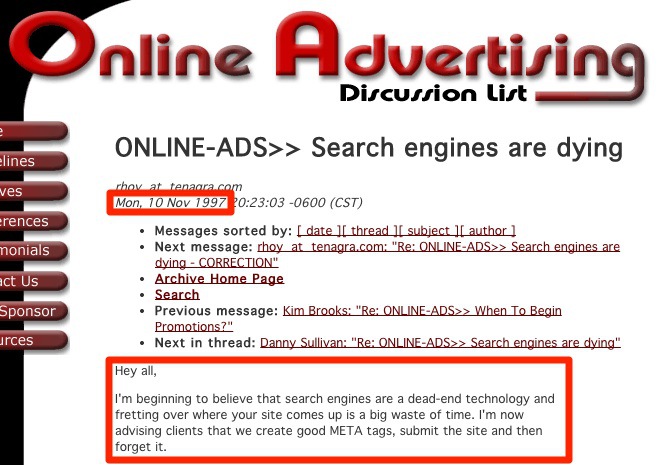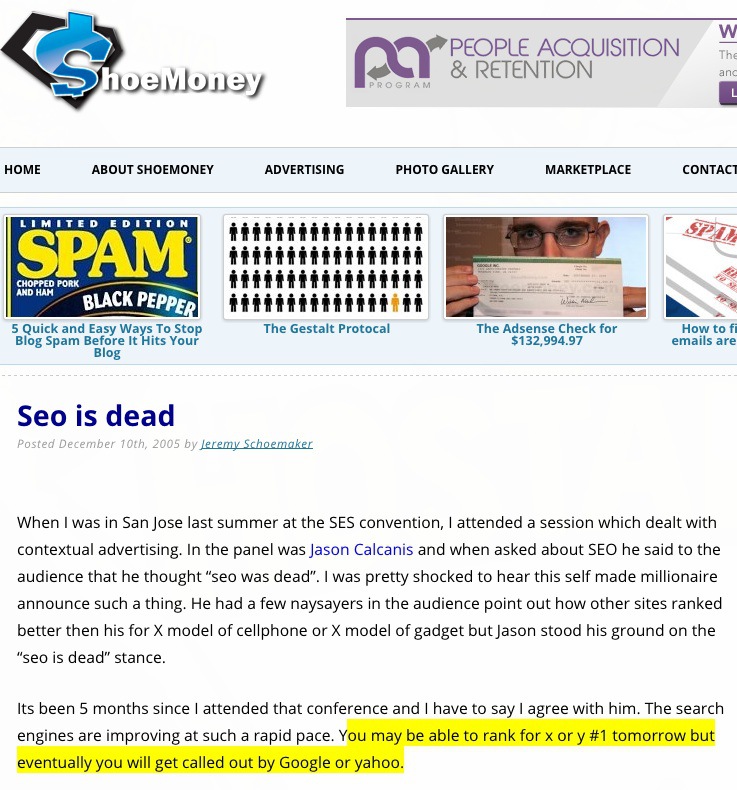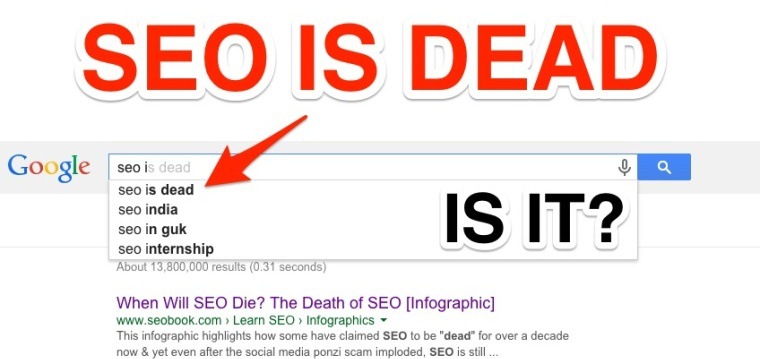While you are reading these lines, SEO’s death is probably chronicled in hundreds of articles all over the internet. A simple search on Google for “SEO is dead” generates no less than 42,600,000 results. Before we decide whether SEO is dead or not, we need to clarify what SEO really means. There are a lot of misunderstandings surrounding what SEO is about, which leads people on the wrong track. If for instance, you think SEO is about tricking search engines, linking schemes, and web spam then yes, SEO is dead.
In a few words, SEO refers to the process of influencing the ranking of a search engine by playing within the guidelines of the search engines.
We can look at search engines as large math equations to be solved. There is no such thing as a “magic” works-for-all SEO solution. The only “trick” you need to know is that there are rules you must be very familiar with, and you need to keep up with all the changes of these regulations.
When Did SEO “Die” For The First Time?
SEO is a concept closely linked to the search industry. So before talking about SEO’s funeral, we need to talk about the search industry’s funeral first. In 1997 the industry of search was “killed” for the first time. In fact, Richard Hoy was the first to mention that search is dead, even before the age of Google.
 Screenshot taken 01/08/2014 of http://www.o-a.com/archive/1997/November/0024.html
Screenshot taken 01/08/2014 of http://www.o-a.com/archive/1997/November/0024.html“I’m beginning to believe that search engines are a dead-end technology and fretting over where your site comes up is a big waste of time. I’m now advising clients that we create good META tags, submit the site and then forget it.” – Richard Hoy, November 1997
Hoy got to this conclusion after he noticed several issues. Some of his concerns at the time included:
- An inverse relationship between the level of site promotion and the percent of traffic from search engines.
- Tools that are so dynamic they change their content every few seconds.
- Tools containing a significant percentage of deceptive information
- Tools requiring you to have a Ph.D. in Boolean logic to even hope to use them effectively.
Here we are now, 18 years later, and some of these issues are still there, even if they are expressed in different ways. People are still complaining about the search engine’s volatility and about how hard it is to understand the complexity of the algorithms.
However, the person who made the “SEO is dead” issue most famous is the web entrepreneur Jeremy “ShoeMoney” Schoemaker. He stated “the search engines are improving at such a rapid pace. You may be able to rank for x or y #1 tomorrow but eventually you will get called out by Google or Yahoo.” In 2005, his post became popular very fast, and in the context of several Google updates back then, the search industry was set on fire by the SEO obituaries. Around 2005 we witnessed the death of textbook SEO techniques, we saw how SEO died along with web 1.0, how copywriting for SEO was long-buried, and how SEO was struggling between life and death.
In all these cases, time was a good adviser and proved these predictions incorrect, as SEO is still a strong business in the present.
 Screenshot taken 01/08/2014 of http://www.shoemoney.com/2005/12/10/seo-is-dead
Screenshot taken 01/08/2014 of http://www.shoemoney.com/2005/12/10/seo-is-deadEven Matt Cutts, the web spam team leader from Google (currently on leave), made a video in 2009 to answer the question: Will SEO still exist in 5 years? Here we are, 5 years later and we are still talking about SEO. One year after that video, in 2010, Google itself released the search engine optimization starter guide, so, if the big G was trying to eradicate SEO once and for all, why would it come up with a SEO guide?
Why Did SEO “Die” so Many Times?
What do cats and SEO have in common? They are both a big deal online and have (at least) 9 lives.
SEO is about understanding how the search engines get their information and what should be done to gain “free” traffic from them. SEO experts and digital marketers in general understand the process of search, and they tap into that process to attract visitors. Of course, that has not necessarily been the case from the very beginning. And the beginning wasn’t that long ago. SEO concept dates back as far as 1997, according to Danny Sullivan. It can be found on the “so 90s” websites of some marketing companies as a new, trendy, service companies might be interested in, to promote their business.
So how does something that’s not old enough to drink in most countries get so many obituaries foretold?
It helps if you picture it as renewal rather than a resurrection, a transformation rather than a reincarnation. It’s akin more to the shedding of reptiles or metamorphosis of a caterpillar into a butterfly.For a long time, SEO promoters were less aware of the distinction between “white hat” and “black hat” and more tempted to improve page rankings by any means necessary. And search engines then were also less aware, taking keyword use at face value, allowing SEOs to go about their business and fostering abuse and manipulation.
Of course, it wasn’t seen as manipulation, because there were no clear rules against it, and because the impact of page ranks wasn’t so big. Quite naturally, when search engines started imposing rules, it felt like the Wild Wild West was getting regulated and becoming less “wild”. When your definition of a concept, be it the Wild West or SEO, gets challenged, there is a natural tendency to call that concept “dead” instead of adapt to the new definition. Even now, there are those calling for retiring the term SEO.
“SEO is Dead” Failed Predictions
Death #1
As search engines became less permissive, SEO changed. Let’s take a look at some of the highlights of SEO’s long string of “deaths”.
[pullquote]Back in the late 90s and early 00s, ranking a webpage was quite simple, or at least this is what we think nowadays: It was all about metatags and keywords.[/pullquote]
You could create doorway pages – one page websites focused on the keyword you want to target – all you had to do was stuff your keyword in the content and you were good to go. But in 2003 Google introduced the Florida and the Cassandra updates, which focused heavily on hidden text and hidden links, the bread and butter of SEOs that time. In the following year, the Austin update happened, further penalizing invisible text and Meta-tag stuffing. That was one of the first “major deaths” of SEO.
Death #2
As time passed, it also became more about links. Back then, it wasn’t even about the quality of the links, just the quantity.
[pullquote]People would go to directory submission sites, article directories, link exchanges or any other way you could get links to your site would help you rank well.[/pullquote]
As we moved on, it became more about the relevancy of the links and the 2003 Cassandra update brought something for the link-farmers and link-traders as well. It started targeting tactics such as link exchanges, making of article directories that contain links to sites or co-owned domains that existed just to make links to the target site. The way SEO was understood died a little more.
Death #3
It wasn’t all about penalizing either.
[pullquote]For a long time, the game was simple: get on top of the search results page.[/pullquote]
But as early as 2005 (and further expanding on it in 2007, 2008, and 2010), Google, and also Bing, changed the game in a major way. You no longer had “the search results page”, but rather “search results pages”: one for each user. Your previous results, social signals from Facebook and Twitter, everything started to matter and influence what was going on in your personal browser. Once search results started getting personalized for each individual user experience, it was a new game altogether. And it wasn’t even necessary to penalize anyone. A lot of businesses who couldn’t adapt probably died around that time, along with yet another meaning of SEO.
Death #4
All of these were really just stepping stones for 2011, the year of the real change.
[pullquote]The bar for quality was raised tremendously in 2011 when Google introduced a new algorithm to decide how to rank pages.[/pullquote]
Since 2011, the Panda algorithm targets websites with too much keyword stuffing, advertising, duplicate content or those that didn’t have quality signals pointing to their sites. It also took personalization one step further (based on searches that you’ve done, website that you’ve visited, your social networks, etc.). You could search for your keywords and see you rank 4th, but someone else can do the same search and see your site ranked 13th, or even on the 2nd page. Since everyone saw a different result, it became increasingly difficult to tell exactly where you rank. The Google Web Toolkit allowed you to see your average rank for various keywords, but that’s the best you could get. A lot of webmasters lost traffic (it’s estimated this update affected 12% of Google search results), and a lot of people believed optimization was no longer possible.
Death #5
In the last three years, Google made SEO even more challenging. In 2012, it introduced the Penguin algorithms, which focused mainly on web spam updates. Penguin checks the links on a website and if it doesn’t like the links pointing to that website, it “demotes” the site’s ranking significantly.
[pullquote]Just because you have a bunch of backlinks, doesn’t necessarily mean you deserve to be ranked.[/pullquote]
Of course, if you find this unfair you can always make a reconsideration request, as long as you have a strong reason to do so, or try to use Google’s disavow tool keep your site “in good company.” If, however, you knew about those links and you were just trying to get some easy link juice, you’re probably in a heap of trouble and what you knew to be SEO is dead and gone.
How Can You Say SEO is Still Alive?
If you think only the long ago changes killed SEO, you weren’t paying attention to last year’s updates. Linking schemes and black hat SEO were the major targets of the last years updates. Guest blogging also started to get the evil eye from Google. Nothing wrong with it, in principle, but it became very popular because people were looking for ways to get links. Just like anything else, guest blogging has been abused, so Google began to devalue the links from guest blogging.
By now you’re probably silently screaming: “What else is left?! How can you say SEO is still alive?…” It is, just in a new way, and there’s still room for optimization. Social relationships are the new backlinks. For instance, you begin following people who have similar topics to yours. Start building relationships and they will share your content from their social media spaces. The more influential content-related people who share your content, the more impact it has on rankings. You can still influence your rankings, but it takes more work and more strategic thinking. SEO is no longer a caterpillar that indiscriminately pillages through link juice, but rather a butterfly that creates a network of meaning.
[pullquote]As you read this article, Google is raising the bar even higher.[/pullquote]
Last year, Google rolled out two new updates: Penguin 3.0, which focuses on link building strategies (less quantity, more quality), and Panda 4.0, which prevent sites with poor quality content from reaching Google’s top search results.
In the end, how do you prepare for the next “death”? Remember, this is an algorithm; it cannot be 100% accurate. So sometimes, the quality sites may get hit. You cannot control Google, but you can control what you do. Diversify your traffic! Write for humans not for search engine bots! Stay away from link building schemes, they might work on short-term but will surely get you penalized heavily in the long-term. Make your content sharable and interesting. Follow people who have sites similar to yours and create connections with them.
SEO is as Dead as Google
As long as search engines exist and are trying to provide users with the most relevant results, the ability to make your site the most relevant will exist. If Google and every other search engine along with it collapse and die, then SEO will probably die along with it. But until that happens, until the system breaks or it is replaced by another one, we are going to have SEO.
How can you capitalize on these changes and what shifts should you be doing? I know it’s not as simple as it sounds, but: avoid over optimization!
[pullquote]Just like with dating, you need to try, but not try too hard.[/pullquote]
The your date, just like Google, will notice it and find it unattractive. You need to have quality backlinks and content. Just as the company you keep in real life says a lot about you, so does the company you keep online. And last but not least, take active interest in what Google thinks about you.
Pay attention to what Google tells you and if they think your actions are shady, make sure you clarify the situation. SEO is always a challenging field, but it doesn’t change all that much. If you’ve been doing the right things, none of these algorithms should be ruining your businesses.
Featured Image: Screenshot taken January 2015




